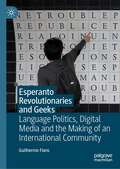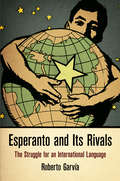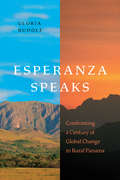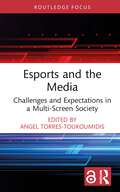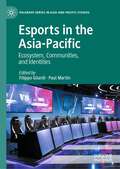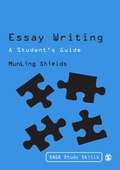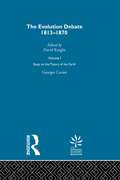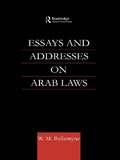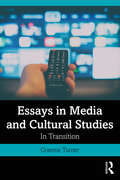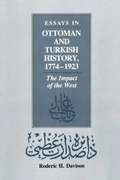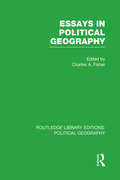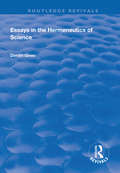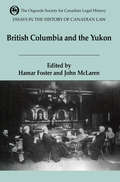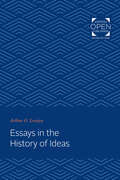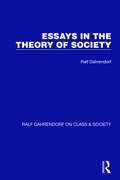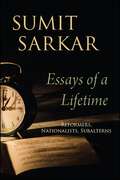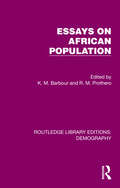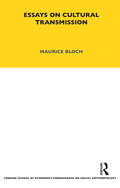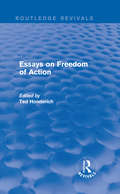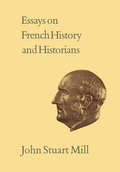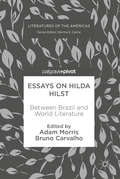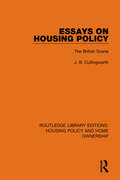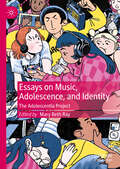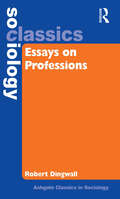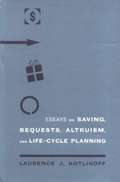- Table View
- List View
Esperanto Revolutionaries and Geeks: Language Politics, Digital Media and the Making of an International Community
by Guilherme FiansThis book explores how Esperanto – often regarded as a future-oriented utopian project that ended up confined to the past – persists in the present. Constructed in the late nineteenth century to promote global linguistic understanding, this language was historically linked to anarchism, communism and pacifism. Yet, what political relevance does Esperanto retain in the present? What impacts have emerging communication technologies had on the dynamics of this speech community? Unpacking how Esperanto speakers are everywhere, but concentrated nowhere, the author argues that digital media have provided tools for people to (re)politicise acts of communication, produce horizontal learning spaces and, ultimately, build an international community. As Esperanto speakers question the post-political consensus about communication rights, this language becomes an ally of activism for open-source software and global social justice. This book will be of relevance to students and scholars researching political activism, language use and community-building, as well as anyone with an interest in digital media more broadly.
Esperanto and Its Rivals
by Roberto GarvíaThe problems of international communication and linguistic rights are recurring debates in the present-day age of globalization. But the debate truly began over a hundred years ago, when the increasingly interconnected world of the nineteenth century fostered a desire for the development of a global lingua franca. Many individuals and social movements competed to create an artificial language unencumbered by the political rivalries that accompanied English, German, and French. Organizations including the American Philosophical Society, the International Association of Academies, the International Peace Bureau, the Comintern, and the League of Nations intervened in the debate about the possibility of an artificial language, but of the numerous tongues created before World War II, only Esperanto survives today.Esperanto and Its Rivals sheds light on the factors that led almost all artificial languages to fail and helped English to prevail as the global tongue of the twenty-first century. Exploring the social and political contexts of the three most prominent artificial languages--Volapük, Esperanto, and Ido--Roberto Garvía examines the roles played by social movement leaders and inventors, the strategies different organizations used to lobby for each language, and other early decisions that shaped how those languages spread and evolved. Through the rise and fall of these artificial languages, Esperanto and Its Rivals reveals the intellectual dilemmas and political anxieties that troubled the globalizing world at the turn of the twentieth century.
Esperanza Speaks: Confronting a Century of Global Change in Rural Panama (Teaching Culture: UTP Ethnographies for the Classroom)
by Gloria RudolfEsperanza Speaks examines a century-long process of socioeconomic change in rural Panama through the experiences of one woman, Esperanza Ruiz, and four generations of her family. The intimate narrative shows how ordinary people, through their choices and actions, are affected by and, in turn, can affect how history unfolds. Readers see Esperanza’s family as both victims and protagonists in their own histories. Born into rural poverty with limited options, they still find small openings to try to improve their lives. Sometimes successful, sometimes not, they survive by drawing on their only abundant resource: each other. Based on twenty field visits over the course of fifty years, Esperanza Speaks is the result of a dedicated anthropologist’s long-term engagement with the individuals of a single community, and a beautiful example of ethnographic storytelling.
Esports and the Media: Challenges and Expectations in a Multi-Screen Society (Routledge Focus on Digital Media and Culture)
by Angel Torres-ToukoumidisThis book takes a multidisciplinary approach to the question of esports and their role in society. A diverse group of authors tackle the impact of esports and the ways in which it has grown within the entertainment industry around the world.Chapters offer a coherent response to the following questions: What role do esports play in the entertainment industry? What communication skills can be learned through esports? What do the media gain from broadcasting esports? What is the relationship between social networks and esports? What are the main marketing strategies used in esports? What effect does communicative globalization have on the development of esports? What is the relationship between merchandising and esports? What do communication experts think about esports? Offering clear insights into this rapidly developing area, this volume will be of great interest to scholars, students, and anyone working in game studies, new media, leisure, sport studies, communication studies, transmedia literacy, and digital culture.The Open Access version of this book has been made available under a Creative Commons Attribution-Non Commercial-No Derivatives 4.0 license: https://www.taylorfrancis.com/books/oa-edit/10.4324/9781003273691/esports-media-angel-torres-toukoumidis
Esports in the Asia-Pacific: Ecosystem, Communities, and Identities (Palgrave Series in Asia and Pacific Studies)
by Paul Martin Filippo GilardiThis is an edited book that fills a gap in knowledge by providing a comprehensive view of esports practice from the Asia and Pacific region. The volume looks at the development of esports through the interconnections between institutions, industries, players, and society, across the Asia-Pacific. Over the last two decades, the Asia-Pacific region has been central to the growth and development of esports. The value of this book lies in its ability to provide a view of esport from countries that are currently underrepresented in the literature such as Vietnam, Malaysia, Taiwan, Hong Kong, Singapore, Philippines and Australia while still integrating chapters looking at more well-researched countries such as China, Korea, and Japan. Through its diverse case studies, the book serves as a resource for scholars and educators worldwide who seek diverse examples with which to improve understanding of the esports phenomenon and the inclusiveness of media and communication curricula. chapters “Introduction to Esports in the Asia-Pacific” and “Conclusions to Esports in the Asia–Pacific” are available open access under a Creative Commons Attribution 4.0 International License via link.springer.com.
Essay Writing: A Student's Guide (SAGE Study Skills Series)
by Munling Shields'An excellent guide for students new to writing essays at university' David Ellicott, Senior Lecturer in Youth Justice and Youth Studies, Nottingham Trent University Essay Writing is a student guide with a mission: to enable students to write better essays and get the grades they deserve by demystifying the essay-writing process. MunLing Shields places essay writing within the larger university experience for students. In a clear and easy to understand way the author guides the reader through the process of writing successful university essays by looking at essay writing in the context of academic communication, academic culture and different learning styles and approaches. This book helps students to study more independently and learn more meaningfully to write better essays. Essay Writing also offers invaluable insights into the way tutors see essays, explaining why essays are set, how to understand the rationale behind them, and demonstrating how best to approach answering the question. This highly accessible book offers practical, in-depth guidance on each of the stages of the essay writing process - planning, drafting and editing - and relates them to the important sub-skills of information-gathering, reading academic texts, how to get the most out of lectures, referencing and citations, and fluency and appropriateness of style and language.
Essay on the Theory of the Earth, 1813
by Georges CuvierBased at the Parisian Museum of Natural History, Cuvier was able to compare the fossil bones he dug from the quarries of Montmartre with those of animals alive today. Guided by the principle of correlation, that all the parts of an animal must cohere, and by analogy, with living species, Cuvier boldly reconstructed extinct creatures from the incomplete skeletons he unearthed. This process is described in his Essay on the Theory of the Earth.
Essays and Addresses on Arab Laws
by W. M. BallantyneGathering together the author’s earlier writings along with essays on recent developments, this text provides essential information for anyone wishing to do business in Arab countries and needing to acquaint themselves with the legal position there. The volume presents an impartial examination of the commercial laws of the Gulf Arab states and gives details of how pitfalls and costly errors can be avoided when dealing with those states. Based on the author's extensive professional experience, the book is indispensable to business men contemplating doing business in the Arab world, and to students of Arab commercial life.
Essays in Media and Cultural Studies: In Transition
by Graeme TurnerSpanning a decade of key research, this collection brings together a selection of essays and chapters from leading media scholar Graeme Turner for the first time. The organising theme of transition focuses on both the state of the media as it continues its evolution into the digital era, and the fields of media and cultural studies as they grapple with modifying their approaches and assumptions in response to the changing dynamics of the systems they study. In their own attempts to understand a range of contemporary moments over the decade, these essays also provide a personal history of Graeme Turner’s participation in the key debates within media and cultural studies. The essays deal with the shifting states of television, with the changing relation between the media and the state, the rise of celebrity, and the role of a critical agenda for media and cultural studies in the future. The collection is introduced and concluded by two new essays, respectively assessing the recent past and the necessary futures for these fields of study. Providing key insights into a range of topics, this book is ideal for students and scholars looking to deepen their understanding of the transitionary nature of media and cultural studies.
Essays in Ottoman and Turkish History, 1774-1923: The Impact of the West
by Roderic H. DavisonThe effect of Western influence on the later Ottoman Empire and on the development of the modern Turkish nation-state links these twelve essays by a prominent American scholar. Roderic Davison draws from his extensive knowledge of Western diplomatic history and Turkish history to describe a period in which the actions of the Great Powers, incipient and rising nationalisms, and Westernizing reforms shaped the destiny of the Ottoman Empire and the creation of the new Turkish Republic. Eleven of the essays were previously published in widely scattered journals and multi-authored volumes. The first of these provides a general survey of Turkish and Ottoman history, from early Turkish times to the end of the Empire. The following essays continue chronologically from 1774, detailing some of the changes in the nineteenth-century Empire. Several themes recur. One is the impact of Western ideas and institutions and the resistance to that influence by some elements in the Empire. Another concerns the diplomatic pressure exerted by the Great Powers of Europe on the Empire, which amounted at times to direct intervention in Ottoman domestic affairs. Taken together, the essays portray a confluence of civilizations as well as a clash of cultures. Professor Davison has written an interpretive introduction that sets out the historical trends running throughout the book. In addition, he includes a previously unpublished article on the advent of the electric telegraph in the Ottoman Empire to show how the adoption of a Western technological advance could affect many areas of life. Of particular interest to students of Ottoman and Middle East history, these essays will also be valuable for everyone concerned with modernization in developing nations. Davison's interpretations and keen methodological sense also shed new light on several aspects of European diplomatic history.
Essays in Political Geography (Routledge Library Editions: Political Geography)
by Charles A. FisherThis volume, originally published in 1968, is in two parts. The first covers various geographical aspects of the internal structure and the external relationships of states and introduces some of the concepts which are examined in specific regional context in the case studies in Part 2.
Essays in the Hermeneutics of Science (Routledge Revivals)
by Dimitri GinevPublished in 1997, this volume is written from a hermenutico-phenomenological point of view. The essays cover a spectrum of relevant issues: the essential interpretation of science; the possibility of a "strong hermeneutics of science" that takes into consideration science's cognitive structure; the implications of existential-ontological interpretations of science for the post-metaphysical dialogue between hermeneutics and epistomology; the place of rhetorical tools in the human sciences; and the strategies of overcoming the legitimation crisis of the human sciences. Because of its commitment to the radical universalization of the hermeneutic problem, the strong programme of hermeneutics of science, suggested in this book, avoids both objectivism and relativism. In this regard, the essays must be read in relation to the search for a middle way between defending epistemic rationality as a basis for futher development of the "project of modernity" and the postmodern deconstruction of all cognitive identities of modernity.
Essays in the History of Canadian Law Volume VI
by John Mclaren Hamar FosterThis sixth volume in the Osgoode Society's distinguished series on the history of Canadian law turns to the a central theme in the history of British Columbia and the Yukon - law and order. In the early days of British sovereignty, the frenzied activity of the fur trade and the gold rush, along with clashes between settlers and Natives, made law enforcement a difficult business. Later, although law and order were more firmly established, tensions continued between the dominant populations committed to the practice and rhetoric of British justice and those groups owing allegiance to other value systems (such as Native peoples, Asian immigrants, and Doukhobors) or those resisting authority (criminals and the criminally insane). These essays look at key social, economic, and political issues of the times and show how they influenced the developing legal system.The essays cover a wide range of topics, and explore the human as well as the legal dimensions of their subjects, relating specific cases to broader theory. They demonstrate that English law has been flexible enough to accommodate diversity and is, therefore, pragmatic. The volume also proves that there is no single Canadian legal culture: geography, demography, politics, economics, and military considerations have had an impact on the shape of our legal culture. The introduction by John McLaren and Hamar Foster pulls together the many regional themes to provide a clear overview of the legal complexities of the period.
Essays in the History of Ideas
by Arthur O. LovejoyOriginally published in 1948. In the first essay of this collection, Lovejoy reflects on the nature, methods, and difficulties of the historiography of ideas. He maps out recurring phenomena in the history of ideas, which the essays illustrate. One phenomenon is the presence and influence of the same presuppositions or other operative "ideas" in very diverse provinces of thought and in different periods. Another is the role of semantic transitions and confusions, of shifts and of ambiguities in the meanings of terms, in the history of thought and taste. A third phenomenon is the internal tensions or waverings in the mind of almost every individual writer—sometimes discernible even in a single writing or on a single page—arising from conflicting ideas or incongruous propensities of feeling or taste to which the writer is susceptible. These essays do not contribute to metaphysical and epistemological questions; they are primarily historical.
Essays in the Theory of Society (Ralf Dahrendorf on Class & Society #2)
by Ralf DahrendorfOriginally published in 1968, these ten essays by one of Europe’s leading sociological theorists deal with important issues on the borderline between sociology and social philosophy and demonstrate the author’s deep insight into history and political analysis. The author maintains that the structures of power in which the political process takes place not only originate change and give it direction, but also produce the fertile conflicts that give expression to the fundamental uncertainty of human existence. Through an examination of various concepts inherent in this dynamic process – power, resistance, conflict, change, freedom, uncertainty – a coherent theory of society emerges.
Essays of a Lifetime: Reformers, Nationalists, Subalterns (SUNY series in Hindu Studies)
by Sumit SarkarA distillation of the historian's finest writings on modern Indian historical themes.For the past forty years or more, the most influential, respected, and popular scholar of modern Indian history has been Sumit Sarkar. When his first monograph, The Swadeshi Movement in Bengal 1903–1908, appeared in 1973 it soon became obvious that the book represented a paradigm shift within its genre. As Dipesh Chakrabarty put it when the work was republished in 2010: "Very few monographs, if any, have ever rivalled the meticulous research and the thick description that characterized this book, or the lucidity of its exposition and the persuasive power of its overall argument."Ten years later, Sarkar published Modern India 1885–1947, a textbook for advanced students and teachers. Its synthesis and critique of everything significant that had been written about the period was seen as monumental, lucid, and the fashioning of a new way of looking at colonialism and nationalism.Sarkar, however, changed the face not only of modern Indian history monographs and textbooks, he also radically altered the capacity of the historical essay. As Beethoven stretched the sonata form beyond earlier conceivable limits, Sarkar can be said to have expanded the academic essay. In his hands, the shorter form becomes in miniature both monograph and textbook.The present collection, which reproduces many of Sarkar's finest writings, shows an intellectually scintillating, skeptical-Marxist mind at its sharpest.
Essays on African Population (Routledge Library Editions: Demography #16)
by K. M. BarbourOriginally published in 1961, this book comprises of 14 studies by scholars and officials with first-hand experience of Africa and deals with the nature and organization of population censuses and with the many uses to which their results may be put. Written at a time of political transition on the African continent it was vitally important that the collection and interpretation of statistics dealing with distribution, density, migration and occupation in Africa continued. This volume shows how demographers, sociologists, anthropologists and geographers were using the research to be followed in the interpretation of the numerous censuses being conducted in the early 1960s.
Essays on Cultural Transmission (London School Of Economics Monographs On Social Anthropology Ser. #Vol. 75)
by Maurice BlochThis book brings together recent work by Maurice Bloch which explores the highly controversial territory between the cognitive and social sciences. The essays are of broad, theoretical interest and aim to combine naturalistic approaches to cognition with a recognition and respect for the cultural and historical specificity of ethnography. All the essays illustrate Bloch's characteristic approach to the relation between anthropology and cognitive science, where cognitive science is used to criticize anthropological assumptions concerning such key topics as religion, kinship, belief, ritual, symbolism and art.
Essays on Freedom of Action (Routledge Revivals)
by Ted HonderichEssays on Freedom of Action, first published in 1973, brings together original papers by contemporary British and American philosophers on questions which have long concerned philosophers and others: the question of whether persons are wholly a part of the natural world and their actions the necessary effects of causal processes, and the question of whether our actions are free, and such that we can be held responsible for them, even if they are the necessary effects of casual processes. This volume will be of interest not only to those who are primarily concerned with philosophy but also to students in those many other disciplines in which freedom and determinism arise as problems.
Essays on French History and Historians: Volume XX
by John Stuart Mill John Robson John C. CairnsJ.S. Mill's deep interest in French intellectual, political, and social affairs began in 1820 when, in his fourteenth year, he went to France to live for a year with the family of Sir Samuel Bentham. French became his second language, and France his second home, where he died and was buried in 1873. His interest in history began even earlier when, as a child of seven, he tried to imitate his father's labours on the History of British India; though he never wrote a history in his maturity, study of the past remained a passion and helped shape the philosophy of history that informed his views of society and ethics. His intense interest in contemporary French politics also led him to seek connections between historical developments and present trends, both seen by his from a Radical perspective approproate to what he believed to be an age of transition. The English historians of France, including Walter Scott and Thomas Carlyle, as well as the French, some of whom were themselves political figures, are judged by their historical methods, but those methods are seen as having practical effects in shaping as well as revealing the mind of the times.This volume brings together for the first time the essays, running from 1826 to 1849, that meld these abiding interests. They give as well insights into Mill's personal aspirations, his developing view of comparative politics and sociology, his concern for freedom, and his feminism. During these years Mill worked on a published his System of Logic, Book VI of which shows in condensed form the results of the speculations here developed; reading these essays with that work, which made his reputation as a philosopher, enables one to see the effects of romanticism on analytic thought in a way not as clearly evident even in Mill's Autobiography. Independently important, then, the essays in this volume also enable us to interpret anew the practical and theoretical concerns fundamental to his formative years and maturity.John C. Cairns' Introduction demonstrates how the essays reveal, through their reactions to the Revolutions of 1789, 1830, and 1848, and to French historiography, politics, and thought, the effect of France on Mill's ideas, and also the way in which his other concerns influenced his reactions to France. The texts, with the variants and notes that are the hallmark of this edition, are described in John M. Robson's Textual Introduction, which explains the editorial principles and methods.
Essays on Hilda Hilst: Between Brazil And World Literature (Literatures of the Americas)
by Adam Morris Bruno CarvalhoThis book is the first collection of critical essays on Hilda Hilst (1930-2004) published in English. It brings together a variety of perspectives on one of Latin America’s most inventive and innovative authors. Nine essays by scholars and translators reflect about various aspects of her work, placing it in the context of Brazil and world literature. During her lifetime, Hilst won several major national literary awards and attracted legions of devoted readers. Her writing spanned styles and genres, encompassing poetry, theatre, and experimental fiction. She was also considered to be “a writer’s writer,” and her literary achievements eluded both mainstream acclaim and international recognition. In recent years, Hilst’s books have enjoyed increased visibility in Brazil and beyond. A host of translators (including three contributors to this volume) have finally made some of her masterpieces available in English. This pioneering collection of essays should excite longtime readers and introduce her to a new audience.
Essays on Housing Policy: The British Scene
by J. B. CullingworthOriginally published in 1979, these essays provide a guide to the labyrinth of issues which together made up ‘housing policy’ in the late 20th Century. The focus is on the practical and political difficulties of devising measures which meet policy objectives – difficulties which are just as prevalent in the 21st Century. The search for ‘comprehensive strategies’ is shown to be a vain one: given the number of relevant issues and their complexity, only an incremental approach is practicable. Major issues are discussed in the context of an analysis of the institutional, historical and financial framework within which housing policy is formulated and operated.
Essays on Music, Adolescence, and Identity: The Adolescentia Project
by Mary Beth RayEssays on Music, Adolescence, and Identity: The Adolescentia Project explores music consumption, self-discovery, media culture, and memory through autoethnographic essays on albums we loved during adolescence covering three decades (1980-2010) as the music industry and socio-cultural identity landscapes in the United States significantly changed. The collection advances our understanding of music culture, identity, and adolescence in three ways. First, by expanding our knowledge of the shifting relationship between music and identity by using historical methods to examine changes in music culture and socio-cultural landscapes from 1980 to 2010. Second, by interrogating the role of musical memory and the act of cultural remembering by including autoethnographic reflective essays charting contributors' experiences of understanding and performing self through a particularly formative album of their adolescence. And third, by critiquing the act of music consumption in relation to identity construction and cultural remembering. By examining these influential albums, we can better understand the role of popular culture in identity construction and the long-term impact of these formative musical experiences.
Essays on Professions (Ashgate Classics In Sociology Ser.)
by Robert DingwallOver the past 30 years Robert Dingwall has published an influential series of articles on the professions, especially law and medicine. This represents a substantial and coherent body of work in an important sub-discipline of sociology. This volume assembles the best of these writings in one single accessible place. The ten essays are republished in their original form, each bearing the traces of the time and place it was written. In sum, they provide a fascinating account of an academic journey. They are introduced with a foreword from the author, who places the work in context and offers some thoughts about how the work might be used by scholars in developing the field, to evaluate, for example, the effects of the New Labour period on professional autonomy. The essays will be indispensable to sociologists with a general interest in the professions and to scholars of law, medicine and business.
Essays on Saving, Bequests, Altruism and Life-cycle Planning
by Laurence J. KotlikoffThis collection of essays, coauthored with other distinguished economists, offers new perspectives on saving, intergenerational economic ties, retirement planning, and the distribution of wealth. The book links life-cycle microeconomic behavior to important macroeconomic outcomes, including the roughly 50 percent postwar decline in America's rate of saving and its increasing wealth inequality. The book traces these outcomes to the government's five-decade-long policy of transferring, in the form of annuities, ever larger sums from young savers to old spenders. The book presents new theoretical and empirical analyses of altruism that rule out the possibility that private intergenerational transfers have offset those by the government. While rational life-cycle behavior can explain broad economic outcomes, the book also shows that a significant minority of households fail to make coherent life-cycle saving and insurance decisions. These mistakes are compounded by reliance on conventional financial planning tools, which the book compares with Economic Security Planner (ESPlanner), a new life-cycle financial planning software program. The application of ESPlannerto U. S. data indicates that most Americans approaching retirement age are saving at much lower rates than they should be, given potential major cuts in Social Security benefits.
